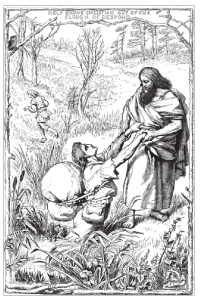Tim C. Taylor's Blog, page 18
January 3, 2012
Author Interview: David A. Cleinman
I hope you enjoyed a fabulous holiday period. I certainly did. It was largely 'computer off' and 'Lego on' for me over Christmas, a great family break. Talking of family, I've an interview for you today with author David A. Cleinman who writes of an altogether less happy family.
Hi David, happy new year and thanks for spending some time with me to answer a few questions. Let's talk about your novel, Principle of Destiny, which features a woman as its lead character. Why did you, as a male author, choose a female lead? Were there challenges to writing the opposite gender, and, if so, how did you address them?
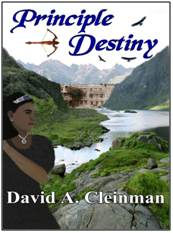 I chose a heroine for a few different reasons. The biggest was probably based on how few female leads are written by male authors. Having a female lead allowed me a wider range of emotions and sensibilities, which are a strong part of my writing. And, in a political commentary, sometimes a woman shows wisdom somewhat better than a man. Alyssa's strength of will is the key to the story, and there is no doubt in this author's mind that this shines through much stronger with a she than a he. Sexism aside, most readers tend to expect a male lead to be tough. When a woman proves to be their equal, it opens up entirely new avenues of thought.
I chose a heroine for a few different reasons. The biggest was probably based on how few female leads are written by male authors. Having a female lead allowed me a wider range of emotions and sensibilities, which are a strong part of my writing. And, in a political commentary, sometimes a woman shows wisdom somewhat better than a man. Alyssa's strength of will is the key to the story, and there is no doubt in this author's mind that this shines through much stronger with a she than a he. Sexism aside, most readers tend to expect a male lead to be tough. When a woman proves to be their equal, it opens up entirely new avenues of thought.
How would you describe your main character, Alyssa? The setting for your book is traditional fantasy, but would you describe Alyssa as a modern or a traditional character?
I would say Alyssa has very modern and progressive ideologies. She would be equally at home in a palace or a capitol building. She has strong instincts, physical prowess, and a stubborn streak that surprised even me. Her willingness to put herself in jeopardy for what she believes is simply amazing, and perhaps a bit unnecessary at times. My favorite aspect of her is her ability to run like the wind. There's a hidden analogy there, somewhere, and I'm still working it out.
That sounds fresh. I like something a little different in my fantasy novels. What marks your novel out from standard fantasy fare?
Aside from the strong heroine, and the lack of mythical figures that are common to true fantasy, is the fact the there is no magic. The setting is semi-traditional fantasy, but really is closer to a turn of the 20th century. Electricity is in use in places, wealthier people have motor vehicles, and telephones. There is an established economic and trade system. Alyssa's sole purpose is to end the feuding and bickering between kingdoms that has erupted since her father decided he would control them through economic coercion and power positioning, rather than unite them and work with them. It's a David vs. Goliath type story in some ways, and War and Peace in others.
In every way this story is about survival, about ethics, and about fighting for rights, both Princess Alyssa's personal rights, as well as what she feels is right.
Now that does sound interesting because I took a similar non-traditional fantasy route with several of my stories. One of the most notable aspects of Principle of Destiny is the challenge at its heart, an extreme endurance test turned into a ritual, political contest. What made you choose this, and how did you make it so realistic?
One of the perks of being a King, positioned in the one spot that everyone needs to access for survival (Lake Tramontane: the single northern lake from which almost all trade is distributed), is the ability to make ridiculous laws and edicts and have people willing to follow them. It's an ancient device used by conquerors throughout history. Make a population dependent on you, and soon they will do pretty much whatever you say. When the only individual the challengers need to beat is the sixteen year old son of the king, Prince Tobias, it is an easy sell. The surrounding nations firmly believe they can provide challengers who will beat him. They are tricked by their own ignorance, in some ways, not thinking clearly enough to realize that maybe the king is not being entirely forthcoming. Tobias has trained all his life for this, and perhaps has help that the challengers do not, nor know about.
The race itself is so realistic because it is actually based on real races, through real terrain, with genuine character reactions and interactions. Alyssa makes this particular event memorable by how she suffers again and again, and yet endures at every obstacle.
Are there more stories to come set in the Kingdom of Landing that is the setting for Principle of Destiny?
I have considered it, but at the moment, no.
How do you find the time to write novels while having a real life too?
My writing, by and by, is my life. My only regret is that I did not put the effort into it I should have since I started my first epic fantasy at thirteen. Having just turned 47, I know that now is the time.
You certainly sound serious. What advice can you give to aspiring authors?
Write. Don't worry if it's good, bad, or even terrible. Just write. Passion provides power. Time and effort will perfect the product. Read as much as you can in the areas/genres in which you wish to produce your works.
What's next for David A. Cleinman?
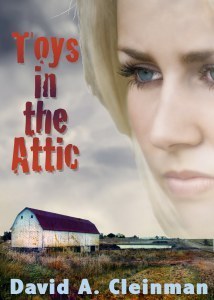 Toys In The Attic is live as Indie eBook.
Toys In The Attic is live as Indie eBook.
I am writing a young adult fantasy series set between the human world and the world of dragons that have been estranged from humanity.
Two other fantasy series are in the works.
A sci fi novel that I wrote in 1998 is being re-tweaked soon.
As always I continue to blog and research for my various projects.
Thanks Tim, for giving me the opportunity to share my works with your readers!
You're welcome, Dave. If you want to find out more about David's writing, take a look at his blog: http://davidcleinman.com/writings/
Principle of Destiny is available at amazon.com | amazon.co.uk | Smashwords | B&N
Toys in the Attic is available at amazon.com | amazon.co.uk | Smashwords | B&N








December 15, 2011
The Reality War is coming soon…
Just an update to let you know that my debut novel, The Reality War: Book 1 — The Slough of Despond, is progressing well. The copy editor is polishing his report, and cover art is moving forward. I'm working as hard as I can on the rewrite to book2 (The Narrow Path), which should be published within weeks of book1.
The copy editor said the cliffhanger ending of book1 was cruel Well, I never said I was a nice guy. There's a (hopefully) big surprise at the end of the first book. They think it's all over… but with a two-book series, it can't be that simple…
The Slough of Despond: an illustration from an 18th-century version of The Pilgrim's Progress
Long time readers of my blog might be asking The Reality What? This is the book that used to be called My Future in the Past, until too many people said that was too boring a title. Guys mostly, to be honest.
At one level, the novels tell a time travel and alternate history story. It's also a fractured love story and an echo of John Bunyan's The Pilgrim's Progress. When I first sketched out the story, this connection with John Bunyan and the location of Elstow, the village where he lived, was what is rather grandly called intertextuality. In other words, I was drawing allusions to The Pilgrim's Progress because that seemed an interesting thing to do, not because it was actually a part of the plot. But my world-building has a heavily literal slant to it. I like to know for myself how everything slots together in my worlds, and that mindset doesn't think highly of coincidence or intertextuality.
So in the version that will be published, the story only makes sense to be set in Elstow, and the connection with John Bunyan is no coincidence. In each of two rival timelines, there is a protagonist making parallel spiritual journeys, just like Christian, the protagonist of The Pilgrim's Progress; there is a reason for this.
For writers thinking about settings for their novels, I wrote a short article about why I chose Elstow here.








eReading in the Age of Austerity on GetFreeEBooks.com
I've guest posted on the GetFreeEbooks.com site. We're living in the Age of Austerity now; what does that mean for reading habits?
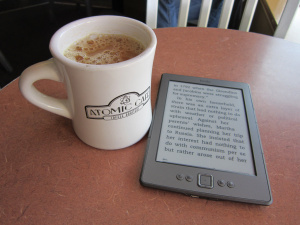
Reading in the Age of Austerity. Photo E. Thomsen








December 8, 2011
Guest interview: Kristy Carey
Today I've got novelist Kristy Carey to answer a few questions about her forthcoming novel.
Can you tell us something about your novel, The Quintessence of Time?
The story is about a young man who chases a former friend across time, trying to stop him from altering the time line. At each stop, he has to track down the man and hope he's able to stop a murder from happening and keep himself from changing his own future.

Click for a large image
It's a catchy title. What made you choose it, and how did you choose it?
It actually took me almost a year to come up with a title for it. I was thinking up words that might work, then making sure I knew the meaning of them, and had picked out The Paragon of Time, only to look it up and find it didn't quite fit what I wanted. However, the Thesaurus offered me Quintessence as another option. Its meaning as being the Pure Essence of something fit perfectly in my mind. I'll admit, there is an aspect of it that might only be understandable to me, but I kind of like the idea of a secret.
It was a Nano Novel. Can you explain what that means and how you approached the writing? Would you do another Nano novel?
A NaNo novel is one that's written during NaNoWriMo, or National Novel Writing Month. Each year during the month of November thousands of people around the world take up the challenge of writing 50,000 words, the average length of a novel, in 30 days. My approach tends to be very… Relaxed in many ways. I started this novel with an Idea, a name and general idea of the ending. I would absolutely do another NaNo novel. In fact, this year I wrote another one title The Charming Line: The Truth Behind the Fables.
What kind of research did you do for The Quintessence of Time? Did you enjoy it or necessary hard labour?
Because I changed the world's history so much, there wasn't a whole lot of research too do. However, at one point I needed to be able to explain a few things in how easily they could change time, and understand physics more. I don't really understand it, but it seemed needed at the time. If nothing else, I needed a little understanding.
Who are the main characters in your novel? What did you most enjoy writing about them? Did they ever start writing scenes by themselves?
There are 5 Primary Characters in the story, but I can only introduce you to 2 of them, as the other 3 are more of a surprise.
Barith is a young man in his late 20′s. He's the son of a servant, who was given the chance to become a skilled worker instead by his parents master. Working with another young man, Jokiam, they build a time machine, something forbidden to even draw a design of. Having decided that the world he lives in is wrong, Barith jumps back in time to start changing history.
Jokiam is in his early 20′s and like Barith, was given an opportunity by his parents master, to become a skilled worker. Jokiam, or Aki to friends, however has a special gift that he works to keep a secret from everyone, as people with gifts are normally jailed or simply vanish. When Barith leaves in the machine they built, he builds his own and follows after to stop his friend and keep history from being destroyed.
More than once, the characters took the story out of my hands and did what ver they wanted.
How do you find the time to do your writing?
Well… Last year I was working and going to school, but I tend to take my laptop almost anywhere I go, so I spent a lot of time on the lappy while at work. Otherwise, I tried to get to as many Write Ins through the local NaNo group as possible. To be honest, I really didn't do a lot of writing between last year's NaNo and this years. I am hoping to work over the next year on one of the other stories I've got in the works, and actually write 750-1000 words every day.
Paper books or eBooks? Discuss…
Personally, I love both books and eBooks. And while I'm not exactly a weak person, I know I don't have what it takes to send out letters and try to get my book published through traditional means. Which is why I'm going to self-publish it.
What was the last book you enjoyed reading (and didn't write)?
Over the last few years, my family has been under a lot of stress and I've been unable to really sit down and read a book. The last one I read, all the way through, was The Magician by Michael S. Scott. Book 3 in a series. However, I did just relisten to some David Eddings books, The Belgariad.
The Quintessence of Time — when can we get to read it?
I hope it'll be Summer 2012.
Thanks for talking about your writing, Kristy. Your book has many parallels with the novel I'm finishing off at the moment (The Reality War). Or, by the sounds of it, perhaps they actually the same book but written in alternate timelines??
Links….
My Blogs: http://howmanydaysinayear.blogspot.com/ and https://kristysvintagefusion.wordpress.com/
My Author FB Page: http://www.facebook.com/KristyCareyAuthor
Twitter: http://twitter.com/#!/Kristy_C








December 6, 2011
No More than Human is a Recommended Read
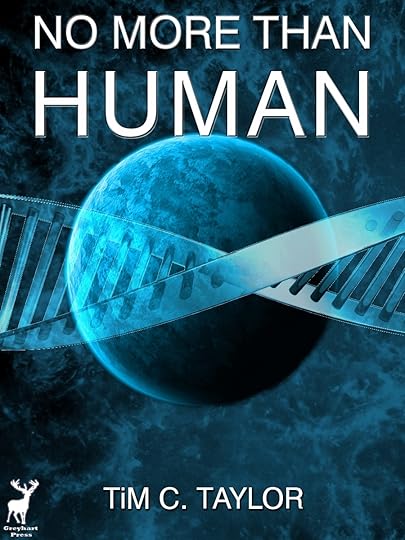 My short story, No More than Human, is featured on the GoodKindles site Must be something to do with the new cover. Thanks for recommending me, GoodKindles.
My short story, No More than Human, is featured on the GoodKindles site Must be something to do with the new cover. Thanks for recommending me, GoodKindles.








December 1, 2011
My artwork and Andy Bigwood's
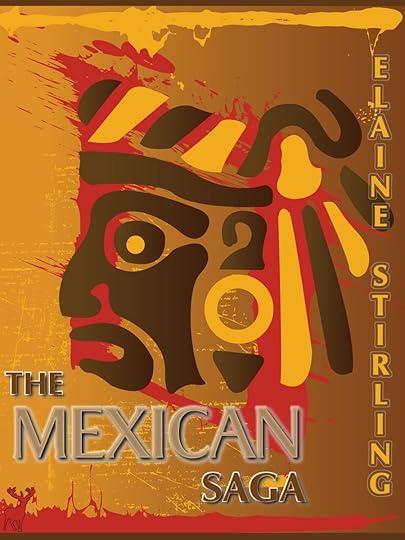 I've been interviewed by author Cheryl Shireman for her site. I mention, amongst other things, the story behind Andy Bigwood's artwork for Last Man Through the Gate (which is now used in the banner for my blog).
I've been interviewed by author Cheryl Shireman for her site. I mention, amongst other things, the story behind Andy Bigwood's artwork for Last Man Through the Gate (which is now used in the banner for my blog).
Andy's currently working on a commission for my debut novels. I can't tell you what they're called because I'm probably going to change the title. I can tell you that they feature Elstow Abbey and are a time-travelling echo of The Pilgrim's Progress.
 So with Andy busy, I've turned my hand to a little cover art myself. I think I'm getting better. In fact, I'm expecting to give my first Gimp tutorial this weekend (Gimp is the tool I use) to my Dad who's coming over to visit. I've put thumbnails in this post of two covers I've worked on this week. If you click on the image, you get a much larger version.
So with Andy busy, I've turned my hand to a little cover art myself. I think I'm getting better. In fact, I'm expecting to give my first Gimp tutorial this weekend (Gimp is the tool I use) to my Dad who's coming over to visit. I've put thumbnails in this post of two covers I've worked on this week. If you click on the image, you get a much larger version.








November 28, 2011
Geekiness is a dominant gene
I think I was seven when I first played a role-playing game. Tunnels & Trolls, it was called, a name that might just have been inspired by the big name of the time: Dungeons & Dragons. T&T involved great fist-fulls of six-sided dice, the number of dice used base upon the 'Monster Rating' of the beastie you were fighting. Later for me came AD&D, and The Fantasy Trip, which mutated into GURPS. After school, I would go to the centuries-old timber-framed Games Shop in Colchester's Short Wyre Street and drool over the games on offer, often picking up White Dwarf Magazine, a publication that evolved over the years into the Games Workshop shops and such things as Warhammer. One of my favourite board wargames was a thing called Imperium, which was the backdrop to the science fiction role-playing game Traveller.
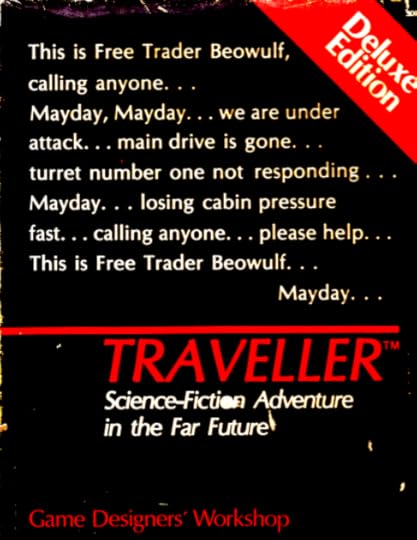 A quarter of a century after I was devising Traveller scenarios for my school friends, and when my five-year-old son gets excited, he sometimes shouts out "Mayday! Mayday! Free Trader Beowulf…" in a reference to the front of the Traveller boxed set. That itself was a reference to the shipboard combat game of Snapshot (Which I played with my big brother. He may well have taken it to Canada when he emigrated.)
A quarter of a century after I was devising Traveller scenarios for my school friends, and when my five-year-old son gets excited, he sometimes shouts out "Mayday! Mayday! Free Trader Beowulf…" in a reference to the front of the Traveller boxed set. That itself was a reference to the shipboard combat game of Snapshot (Which I played with my big brother. He may well have taken it to Canada when he emigrated.)
Phew! Some of you might be considering calling the men in white coats after that trip down Geek Lane, but I really am that game geeky, and am proud of it (when not in polite company, anyway).
RolePages.com
So (this is the bit where I get to the point) I was delighted to come across www.rolepages.com Against one of the ongoing 'worlds' (or add one yourself) you get to confront and compete against other participants, contribute background notes, artwork, poetry, prose fiction, ramblings…
What struck me most about the site was how much fun everyone seemed to be having. And having fun at being creative. I sometimes feel the importance of having fun is sometimes lost on the more po-faced wing of the science fiction family.
I love my 'professional' short science fiction. Sometimes, though, I find it exasperating when writers, editors and reviewers get so obsessed with the need for the fiction to be clever that they forget about the value in telling a story, or in using language that is clear rather than obscure. To have a plot and be enjoyable… that sort of thing.
Trillion Credit Squadron
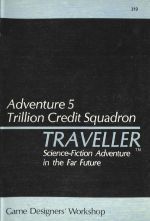 Back in the early 80s, there was a Traveller spin-off called Trillion Credit Squadron. In those days — before real-life governments built up so much debt and inflated old debts away — a trillion seemed an unimaginable large amount of any currency. The idea is that with these huge sums, you got to build huge fleets and fight big space battles. And that's what I did. Lead miniatures were on sale for these sorts of battles, but we used bits of Lego to represent the ships. We didn't mind because it was fun and we were being creative. We didn't need professional polish to enjoy ourselves. (I also cut up hair rollers to make 5mm Napoleonics, but don't tell anyone as that sounds a bit weird).
Back in the early 80s, there was a Traveller spin-off called Trillion Credit Squadron. In those days — before real-life governments built up so much debt and inflated old debts away — a trillion seemed an unimaginable large amount of any currency. The idea is that with these huge sums, you got to build huge fleets and fight big space battles. And that's what I did. Lead miniatures were on sale for these sorts of battles, but we used bits of Lego to represent the ships. We didn't mind because it was fun and we were being creative. We didn't need professional polish to enjoy ourselves. (I also cut up hair rollers to make 5mm Napoleonics, but don't tell anyone as that sounds a bit weird).
We used to immerse ourselves in science fiction and fantasy — whether reading, playing with Lego battlefleets, or Dungeons or Dragons — because we enjoyed being immersed in other worlds that were not bounded by the limitations of real life. I'm sure the participants in RolePages are just the same today. I'm delighted people still feel the same way, but really they never stopped.
We love Harry Potter and watch Star Wars, but we don't do that because we want the author or scriptwriter to hold a mirror up to contemporary society to tell us something about the human condition. (I loathe that phrase. Who on Earth reads fiction to be taught about the human condition? Go read some non-fiction for that.) People indulge in fantastic worlds because of the thrill, the sense of wonder, the escapism… because it's fun!
The Gift of Joy
 I've read a lot of short story collections and anthologies. My second-favourite collection is The Gift of Joy by Ian Whates. I know Ian personally (which was cool because I got him to sign my hardback copy of the book). He's a clever guy and a thoughtful writer; his stories have depth. But he doesn't use his skill to write stories that are designed to make readers feel a bit stupid. Instead, his language is a smooth as the finest quality ice cream on a hot, summer's day. He's like the literary equivalent of Ben & Jerry's except not as messy to carry around in your bag. And as anyone who has tried to do it at home will vouch, making good ice cream isn't as easy as it sounds.
I've read a lot of short story collections and anthologies. My second-favourite collection is The Gift of Joy by Ian Whates. I know Ian personally (which was cool because I got him to sign my hardback copy of the book). He's a clever guy and a thoughtful writer; his stories have depth. But he doesn't use his skill to write stories that are designed to make readers feel a bit stupid. Instead, his language is a smooth as the finest quality ice cream on a hot, summer's day. He's like the literary equivalent of Ben & Jerry's except not as messy to carry around in your bag. And as anyone who has tried to do it at home will vouch, making good ice cream isn't as easy as it sounds.
The same day I found www.rolepages.com , Ian's collection was hammered in an online review for precisely the reasons I enjoyed it so much. To paraphrase the reviewer, Ian's fiction 'only' told stories, his words were 'everyday' rather than clever. I don't object to that kind of a review because it was coherent and honest (unlike the deliberately malicious and self-serving reviews that abound). No, I don't object but I wholeheartedly disagree, and felt in good company to feel that way because I'm sure many of the members of RolePages would feel the same way.
So there you have it. If you are the sort of person who looks down their nose at 'childish' role-playing, and considers the phrase 'old-fashioned storytelling' to be the most serious of literary insults, then stay well clear of RolePages and for goodness' sake, whatever you do, don't read The Gift of Joy.
What about you, though? I'd love to hear from rolepages.com members and memories from yester-geek.








November 18, 2011
Guest post: Mike Cooley defends self-publishers
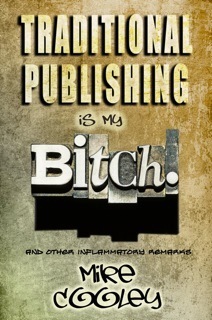 Passion in a author is an essential ingredient in the mix that leads to great fiction. My guest blogger Mike Cooley has passion. Read for yourself…
Passion in a author is an essential ingredient in the mix that leads to great fiction. My guest blogger Mike Cooley has passion. Read for yourself…
I am primarily a fiction writer, but from time to time something pisses me off and I jot down some non-fiction. Usually those things end up on my blog, but in this case I wanted a wider audience for my thoughts, so I wrote Traditional Publishing Is My Bitch!
It all started with a popular web site that I will refer to as A & W. They are a vindictive lot there. It's always their way or the highway and they really don't let logic interfere with their world view. They have attacked friends of mine and banned them from the site simply for stating the truth. They have posted one-star reviews just to try to bring us down. They are petty and jealous.
And they are upset that their long held ideas about publishing are being turned upside down.
Well, it happened one too many times for me when they attacked David Gaughran and his awesome book Let's Get Digital. So I wrote my response.
In the beginning it was just a rant. I wanted the title and the cover to be provocative, and the contents to be a little more logical and reasonable. Just going over the reasons I self-publish and the reasons I think it's a better way to go.
Shortly after publishing the rant—for free on Smashwords—I wrote a blog post about helpful self-publishing hints (really just a cliff's notes sort of thing with a paragraph on each topic). Nothing nearly as comprehensive as David's book (which is why there is a link to his book at the end of mine). I decided it would be a good idea to add that section to the book, so I did.
About that time the pricing had trickled around and Amazon price-matched it to free. At which point it took off. It was nice to see "sales" every day on Amazon even if they were just free downloads. At least people were reading it. I got a lot of nice emails and tweets from fellow writers who agreed with my assessment.
Then, just as suddenly, the price went to 99 cents (I think BN raised the price and then Amazon matched). At that point it went to #11 in the Paid / Authorship category briefly and I had to do a short and awkward "happy dance."
I felt that it was a little short for 99cents when that happened so I added excerpts from three of my fiction books to the end, with links to the books on Amazon.
It's part rant, part pep talk, part helpful hints, and part fiction now. It started out free and just for promotion and it has turned into something more.
And I can't stop without mentioning Christine of Flip City Covers. Her cover art makes it look so professional. If you need a cover, look her up: http://flipcitycovers.blogspot.com [I have. She's great and I'm thinking of using her myself. Tim]
I'm a self-published author. And I write well. And I'm not going to sit idly by while people generalize and lie about me and my friends. We have just as much right to be successful as they do. They don't have to like it. But attack me, and I will defend myself. Attack my friends, and I will do so ten-fold. That's just the way it is.
A bit about Mike
 Mike's a science fiction and fantasy author with a collection of short stories and several shorter works to his name. He has recently released the first in the Crystal Warrior series of fantasy novels. His short Twilight parody (How To Keep Sparkly Emo Vampires Off Your Lawn ) wins the (un-) coveted Tim C. Taylor award for best-named book of the month.
Mike's a science fiction and fantasy author with a collection of short stories and several shorter works to his name. He has recently released the first in the Crystal Warrior series of fantasy novels. His short Twilight parody (How To Keep Sparkly Emo Vampires Off Your Lawn ) wins the (un-) coveted Tim C. Taylor award for best-named book of the month.
Traditional Publishing Is My Bitch! Is available as an eBook from a number of retailers, including amazon.com and amazon.co.uk
Find out more about Mike at: Mike's blog | Mike's page on amazon.com








November 8, 2011
Does poetry have any place in science fiction and fantasy storytelling?
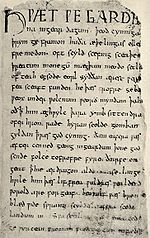
Beowulf
When I set up my publishing business, I decided to set out my stall and state what Greyhart Press stood for. After all, if it doesn't stand for anything, it stands for nothing… and why would anyone go looking for books from a publisher that doesn't know what it wants to publish?
So I wrote the Real Story Manifesto. You can follow the link if you like, it won't bite honest! The essence of the manifesto is that I want to publish stories with a strong and traditional narrative structure, where the storytelling was designed to tell the story.
Sounds pretty obvious, doesn't it? I mean, what is the purpose of storytelling other than to tell a story? But I was thinking primarily of science fiction short stories where the semi-pro and pro markets sometimes publish stories that are deliberately vague or describe a moment in time rather than a traditional story. Science fiction is strange like that. It's derided by some for delivering lightweight, cliché-ridden stories with plot holes light-years wide (particularly genre TV). On the other hand, it sounds like I'm knocking another wing of the science fiction family for going so 'literary' that it sometimes seems to champion post-storytelling.
So you'd think that, given all I've just written, poetry wouldn't fit into this Real Story Manifesto. When I wrote the manifesto, I would have agreed with you. After all, poetry can be obsessed by word choice, and structure, even the way the lines are laid out upon the page. If a mass-market novel is burger and fries, a poem is an espresso taken standing up, and unadulterated even by biscotti.
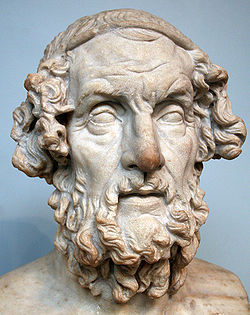
Homer, yesterday
So does poetry have a place in science fiction and fantasy? Well, of course it does and always has done. It might have been a niche within a niche, but, many science fiction and fantasy magazines and websites have featured poetry. I've heard them read out at conventions. Fragments of poetry and song have always been commonplace in novels, and I can confirm that that books of science fiction poetry do exist. Then there's the Iliad…
Fast-forward seven months to last week when I published a book of six poems, called The Legends of Light. That certainly hadn't been part of the game plan.

The form is part of a poem's beauty
What surprised me when I first read the manuscript for Legends… was how clearly these poems were about storytelling. Not only did each poem tell a story, but they are like episodes in a six-part TV mini-series, telling a coherent whole. The author had a young adult (YA) audience firmly in mind, and I think she hits that mode beautifully because the stories, both individually and in series, are about transformation, about aging, learning, and growing up. The words, lines, and stanzas are the medium that she chooses to convey those stories. And what a rich medium they make. The rhythm of the poems gives an otherworldly, ethereal quality to the stories that fits the high fantasy genre perfectly. I'm normally dubious about 'ere's and mayhaps in fantasy prose. Here, the slightly elevated language of the poems suits the fantastic worlds in which they are set, and delights us when (still keeping the poetic language) the poems pass some wry comment about universal truths such as sibling rivalry and a teenager's apprehension about making career choices.
In this case, the choice of poetry over prose enhances, not weakens, the storytelling. That's the Greyhart Press philosophy and so I had no qualms about publishing.
So that's a little of my personal Odyssey over the past few months in the realms of storytelling (to reference another fantastic poem with great storytelling) What about you? What's your experience of poetic storytelling in science fiction and fantasy?
***
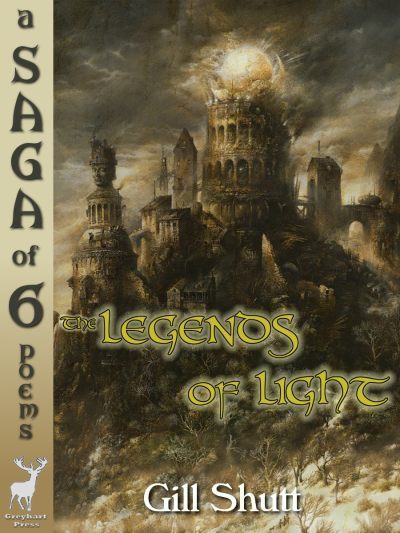 The Legends of Light, a six-poem high fantasy saga by Gill Shutt, is published by Greyhart Press. List price, $2.99, £1.75
The Legends of Light, a six-poem high fantasy saga by Gill Shutt, is published by Greyhart Press. List price, $2.99, £1.75








November 4, 2011
Keyboard shortcuts and how to disable indexing on Kindle 3
My Kindle3 (Kindle Keyboard) recently started grinding to a halt every time I added a note or a highlight (a wait of up to a couple of minutes to save each note). A bit of digging showed that my firmware had recently updated to version 3.3 and this had re-enabled indexing.
Indexing is great for finding text within books. As any software coder will tell you, indexing isn't easy to get right and there are always trade-offs. I'm an editor. I often make several thousand Kindle highlights and notes every month. That makes my usage pattern unusual enough that Amazon's default settings make my Kindle unusable. I had previously solved this by disabling indexing. Unfortunately I'd forgotten how.
So here, as a reminder-to-self for the next time I need this, is how to disable indexing.
Start at the HOME screen
Bring up the search window (hit a letter key and then delete it)
type in ;debugOn + ENTER You need to match the case and you need the symbol window OFF before you hit enter (the bit in the middle of the 5-way controller)
type ~help + ENTER to check you've activated debug mode.
enter 'disableIndexing
enter ;debugOff
Not obvious, but works a treat.
Incidentally, there are a whole host of keyboard shortcuts you might not know about. Here's a few:
ALT+SHIFT+H Takes a screenshot (as a .gif file) and leaves in your 'documents' folder on the kindle
HOME->MENU->Settings->MENU->Restart This gives a soft reset. Basically, if anything seems wonky, try this first. It's like rebooting your PC.
ALT+SHIFT+M is naughty, so I won't mention that.
There are loads more. Here's a site that keeps a list. You can even download them to your Kindle. You might come across hacks that are downloaded applications. Be vary wary of these as they might become unstable with future firmware updates, and could be malicious.









